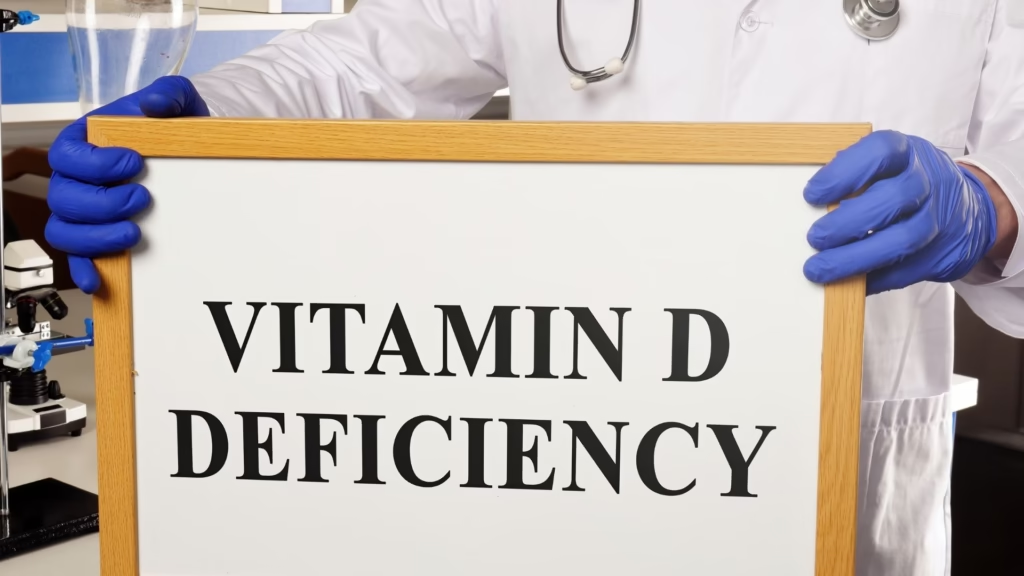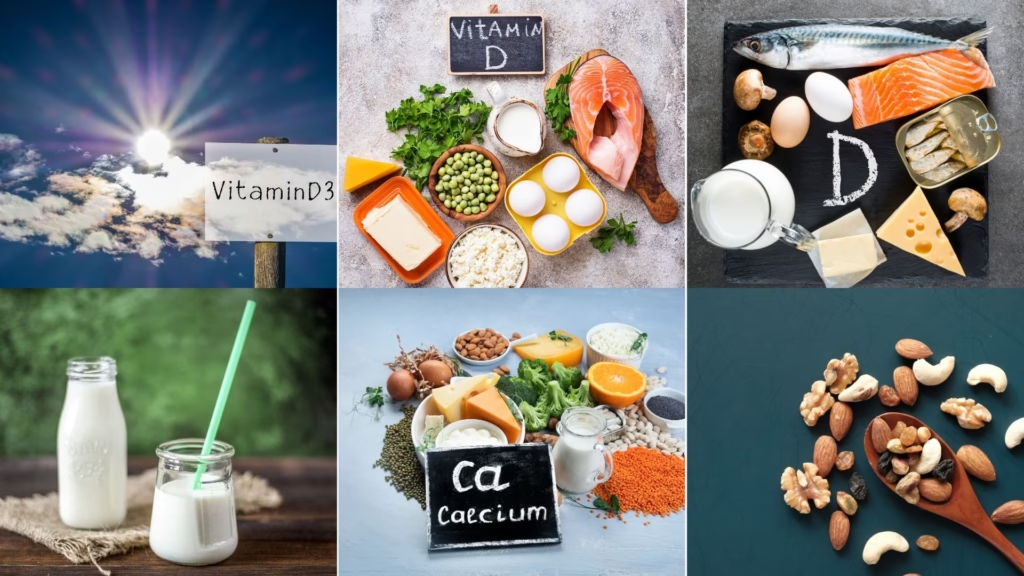The Vital Role of Vitamin D3 and Calcium
Vitamin D3 and Calcium Deficiency Symptoms : Their Importance for the Human Body
Vitamin D3 and Calcium are essential nutrients that play critical roles in maintaining overall health and well-being. While they are often discussed separately, their synergistic relationship is key to ensuring optimal body function. In this blog, we’ll explore the symptoms of Vitamin D3 and Calcium deficiencies, highlight their importance for various parts of the human body, and provide regional insights supported by facts and statistics.

Image Credit : Canvas
Global Statistics on Vitamin D3 and Calcium Deficiency
Vitamin D3 Deficiency by Region
- North America: According to the National Health and Nutrition Examination Survey (NHANES), 41.6% of the U.S. population is Vitamin D3 deficient, with higher prevalence among African Americans and Hispanics.[*][*]
- Europe: Approximately 40% of Europeans have suboptimal Vitamin D levels, with deficiencies particularly high in northern countries due to limited sunlight.
- Asia: Studies indicate up to 80% of South Asians are deficient in Vitamin D, largely due to dietary habits and urban lifestyles.[*]
- Africa: Despite abundant sunlight, Vitamin D deficiency affects nearly 25% of the population due to cultural practices that limit sun exposure.
Calcium Deficiency by Region
- India: Up to 90% of the Indian population suffers from calcium deficiency, driven by low dietary intake.[*]
- China: Research shows that over 50% of Chinese adults fail to meet the recommended daily calcium intake.
- Sub-Saharan Africa: Calcium deficiency is prevalent due to limited access to dairy products.
- Western Countries: While less common, specific groups, such as the elderly, are still at risk of calcium insufficiency.
Deficiency Symptoms of Vitamin D3 and Calcium
Symptoms of Vitamin D3 Deficiency
Vitamin D3, also known as cholecalciferol, is essential for bone health, immune support, and more. Signs of deficiency include:
- Weak bones and Muscle cramps: Insufficient Vitamin D3 can hinder the absorption of calcium, potentially leading to weakened bones and muscle discomfort.
- Fatigue and Tiredness: A common but often overlooked symptom of Vitamin D3 deficiency is chronic fatigue.
- Mood Disorders: Vitamin D3 plays a role in brain health; its deficiency is linked to depression and anxiety.
- Frequent Illnesses: Vitamin D3 supports the immune system. A lack of it may result in recurrent colds or infections.
- Slow Wound Healing: Insufficient Vitamin D3 levels can impair the body’s ability to heal injuries.
Symptoms of Calcium Deficiency
Calcium is a fundamental nutrient for bone health and cellular functions. Signs of deficiency include:
- Osteoporosis: Low calcium levels weaken bones, increasing fracture risks.
- Muscle Spasms: Calcium deficiency often manifests as painful muscle cramps or spasms.
- Numbness and Tingling: These symptoms in the extremities may signal inadequate calcium.
- Dental Issues: Deficiency can lead to weak teeth and increased susceptibility to cavities.
- Abnormal Heart Rhythms: Heart function can be disrupted, leading to abnormal heart rhythms and other related issues.
Importance of Vitamin D3 and Calcium for the Human Body
Vitamin D3 and calcium work as a team to keep your bones strong and your body healthy. Here’s how they’re connected in simple terms:
- Helps Absorb Calcium: Vitamin D3 helps your body absorb calcium from the food you eat. Without enough Vitamin D3, your body can’t use calcium properly, no matter how much you consume.
- Keeps Bones Strong: Calcium is like the building block for bones, and Vitamin D3 is the helper that ensures calcium gets into your bones to make them strong and healthy.
- Balances Calcium Levels: Vitamin D3 makes sure there’s the right amount of calcium in your blood. If your body needs more calcium, Vitamin D3 helps take it from your bones or absorb it from your food.
1. Bone Health
Vitamin D3 enhances the absorption of calcium from the digestive tract, ensuring that your bones remain strong and healthy. Together, they prevent conditions like rickets in children
2. Muscle Function
Calcium is essential for muscle contraction, while Vitamin D3 ensures the availability of calcium for these contractions
3. Immune Support
Vitamin D3 is crucial for immune system regulation. It activates T-cells, which protect the body from infections. Adequate levels reduce the risk of autoimmune diseases.
4. Nervous System
Calcium plays a critical role in facilitating nerve signal transmission throughout the body. Vitamin D3, in turn, ensures sufficient calcium is available for these processes, supporting cognitive and neurological functions.
5. Skin Care
It promotes skin cell repair and regeneration, helping to reduce inflammation and support a healthy complexion. Vitamin D3 is also linked to managing conditions like eczema and psoriasis.
6. Weight Loss
Some studies suggest that adequate Vitamin D3 levels may aid in weight management by regulating fat metabolism and improving insulin sensitivity.
What Happens Without Enough of Them?
- If you’re low on Vitamin D3, your body struggles to use calcium, leading to weak bones, muscle cramps, or even serious issues like osteoporosis.
- If you’re low on calcium, your bones and teeth can become brittle, and your body might not function properly.
Together, Vitamin D3 and Calcium are essential for strong bones, healthy muscles, and overall well-being!
However, excessive intake of Calcium or Vitamin D3 can have side effects. Too much calcium can lead to kidney stones, constipation, and impaired absorption of other minerals. It may also cause calcium deposits in soft tissues, leading to organ damage. Excessive Vitamin D3 can result in hypercalcemia (elevated calcium levels in the blood), which may cause nausea, vomiting, weakness, kidney damage, and calcification of soft tissues. It’s important to maintain balanced levels through proper supplementation and diet.
How to Address Vitamin D3 and Calcium Deficiencies

Image Credit : Canvas
Natural Sources for Vitamin D3 and Calcium
- Vitamin D3:
- Sunlight: The skin synthesizes Vitamin D3 upon exposure to sunlight.
- Foods: Fatty fish (salmon, mackerel), egg yolks, and fortified foods like milk and cereals.
- Vegan-Friendly Options: Fortified plant-based milk, lichen-based supplements, and mushrooms.
- Calcium:
- Dairy: Milk, cheese, and yogurt are excellent sources.
- Non-Dairy: Leafy greens (kale, spinach), almonds, and tofu.
- Chia seeds provide about 18% of the daily recommended calcium intake, which is essential for maintaining healthy bones. Learn more about Amazing Facts About the Benefits of Chia Seeds.
Supplements
- Vitamin D3: Supplements are recommended for individuals with limited sun exposure or dietary intake.
- Calcium: Supplements can help meet daily requirements but should be taken under medical advice to avoid risks like kidney stones.
Vegan-Friendly Vitamin D3 Options
For individuals following a vegan lifestyle, finding sources of Vitamin D3 that align with dietary restrictions is crucial. Some vegan-friendly options include:
- Lichen-Based Supplements: Lichen is a plant-based source of Vitamin D3, making it suitable for vegans.
- Fortified Foods: Look for fortified plant-based milk (almond, soy, oat), cereals, and orange juice.
- Mushrooms: Certain mushrooms exposed to sunlight or UV light can naturally produce Vitamin D2, a viable alternative.
- Vegan Multivitamins: Many brands offer multivitamins specifically designed for vegans, which include plant-derived Vitamin D3.
Lifestyle Changes
- Spend time outdoors to boost Vitamin D3 synthesis.
- Maintain a balanced diet rich in Vitamin D3 and calcium.
- Regular exercise to improve bone density and overall health.
Conclusion
Vitamin D3 and calcium are indispensable for maintaining a healthy body. From strong bones and muscles to a robust immune system, radiant skin, and effective weight management, these nutrients play a multifaceted role. However, deficiencies are widespread globally and require proactive management through diet, supplements, and lifestyle modifications.
By recognizing the symptoms of deficiency and understanding their importance, you can take charge of your health and ensure your body functions at its best. Make sure to consult healthcare professionals for personalized advice on meeting your Vitamin D3 and calcium needs.
Disclaimer:
This information is intended for general educational purposes only and should not be considered as medical advice. Always consult with a healthcare professional before making changes to your diet, supplements, or lifestyle.
About The Author
You may also like
-
4 Key Insights on the Difference Between GYN and OB-GYN: Your Guide to Expert Women’s Care
-
Top 7 Amazing Facts About the Benefits of Chia Seeds : A Superfood for the Whole Body
-
“Is missed Period sign of Pregnancy? 5 Important Symptoms You Should Know”
-
Top 10 Best Foods for Prebiotics and Probiotics
-
How to fix Gut Health Naturally – 10 Simple Tips for a Healthier, Happier You
